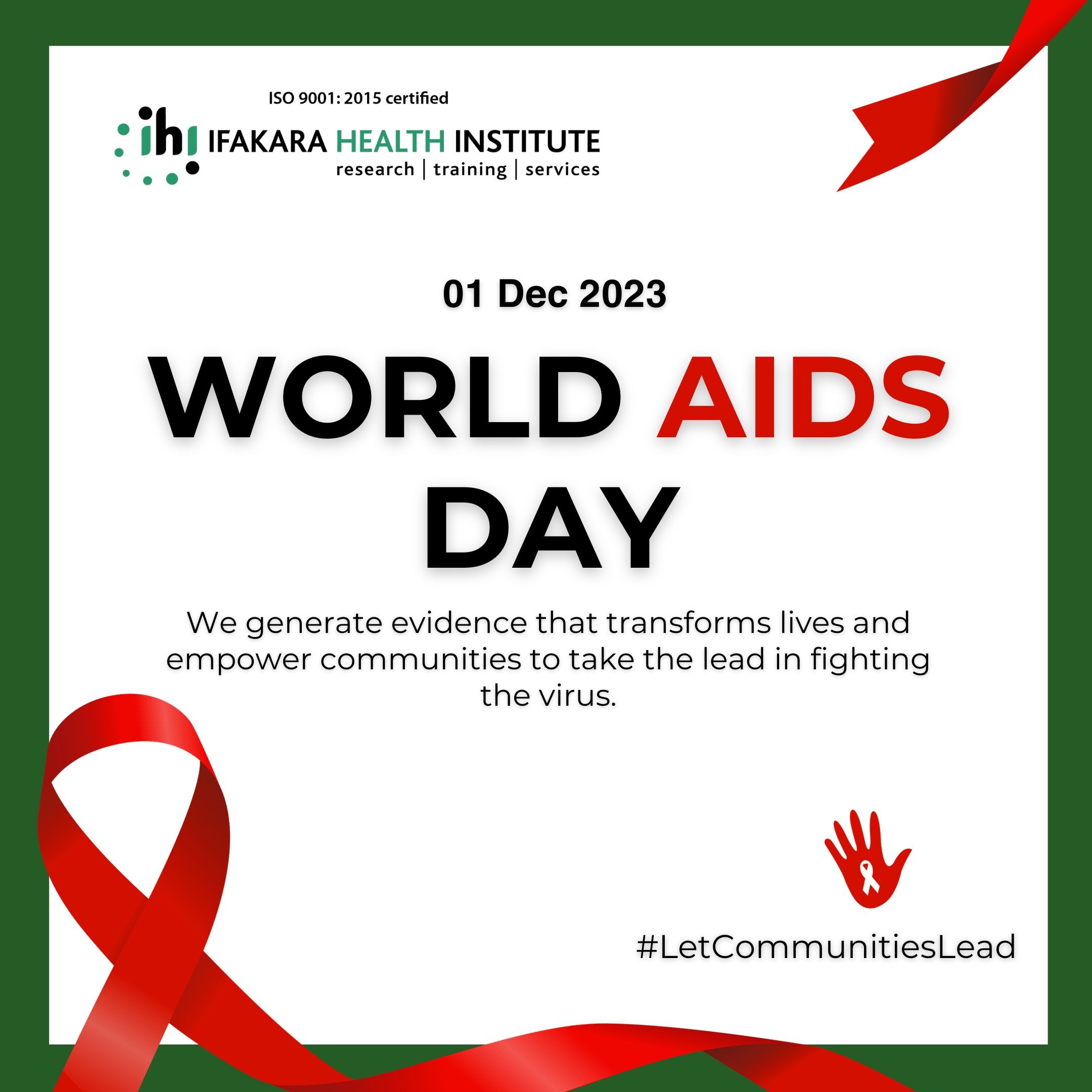
WORLD AIDS DAY: Let communities lead in the fight against the virus!

Dec 1st 2023 was World AIDS Day! The Ifakara Health Institute staff led by our Chronic Diseases Clinic of Ifakara (CDCI) team engaged the pucblic through sharing of knowledge about the virus around this year’s theme: Let communities Lead.
We, at Ifakara, strongly believe that communities living with, and affected by HIV, networks of people from key populations and youth leaders have been, and continue to be, essential for progress in the HIV response.
First HIV case in Tanzania
In 1983, the Kagera region reported the first case of HIV infection in Tanzania, marking the onset of a challenging battle against the epidemic. Since then, the Ifakara Health Institute (Ifakara) has been at the forefront of addressing these challenges, striving to make significant strides in HIV/AIDS research initiatives aimed to improve patient care and identify effective strategies for tackling the epidemic at the community level.
The Chronic Diseases Clinic of Ifakara (CDCI)
The Chronic Diseases Clinic Ifakara (CDCI) was established in 2004 and is a model clinic for HIV care in rural Africa. It has grown successfully out of a collaboration between Swiss and Tanzanian institutions. These are the Swiss Tropical and Public Health Institute (Swiss TPH), the University Hospital Basel, the Ifakara Health Institute and the St. Francis Referral Hospital (SFRH).
Since the initiation of the CDCI, more than 12,000 HIV-positive individuals were enrolled into care, applying a hospital-wide testing strategy for all patients within the catchment area of the SFRH – leading to The Kilombero and Ulanga Antiretroviral Cohort (KIULARCO) allowing to analyse important research questions.
The Kilombero and Ulanga Antiretroviral Cohort (KIULARCO), involving nearly 6000 patients under follow-up since 2004, provides a valuable resource for longitudinal studies. This collaboration strives to unravel critical aspects of HIV medicine, including opportunistic infections, adherence to antiretroviral therapy, liver outcomes, AIDS-related malignancies, and the prevention of mother-to-child transmission.
More on the CDCI here
World AIDS Day
The history of World AIDS Day dates back to 1988 when the World Health Organization (WHO) declared it an official global health observance. Observed on 1 December every year since then, it serves as an international day dedicated to raising awareness of the AIDS pandemic caused by the spread of HIV infection and mourning those who have succumbed to the disease.
More on World AIDS Day here
One Stop Clinic
IHI, renowned for impactful research, significantly contributes to CDCI's work, focusing on understanding the unique dynamics of HIV/AIDS in rural Tanzania. Nested withing the CDCI is an innovative project called “The One Stop Clinic” founded in 2014. The clinic provides an exemplary medical setting for HIV-affected families unifying all services for HIV-positive pregnant women and their families under one roof. Improve access to care and treatment for HIV-infected pregnant women, their offspring and partners living in the Kilombero district and serves as a model clinic for other rural settings in Tanzania and sub-Saharan Africa.
More on the One Stop Clinic here
Capacity strengthening
Aside from clinical care, Ifakara through the CDCI actively contributes to healthcare capacity building through training programs, empowering local healthcare staff with the knowledge and skills needed for quality HIV care.
This approach not only improves immediate patient outcomes but also establishes a sustainable model for healthcare capacity building in the region. It underscores IHI's commitment to fostering sustainable healthcare practices, ensuring that today's knowledge contributes to ongoing advancements in the field.
As we commemorate World AIDS Day, it is crucial to emphasize the role of communities in leading the fight against the virus. Additionally, policymakers and funders play a vital role in making a difference, supporting initiatives that address the challenges posed by the HIV epidemic.
Communities can take the lead in ending stigma, fostering an environment of understanding and support. In this collective effort, organizations like IHI and partners are leaders in transforming the landscape of HIV healthcare in Tanzania through dedication and innovation.
Let communities lead through research
Through initiatives such as the Chronic Diseases Clinic Ifakara (CDCI) and the One Stop Clinic, Ifakara has not only contributed significantly to advancing our understanding of HIV/AIDS but has also exemplified a commitment to holistic and community-centric healthcare.
By integrating research, innovation, and capacity-building, IHI ensures that interventions are not only effective but also reflective of the diverse needs of the communities it serves.
Engaging with youth
On Saturday, December 2nd, 2023, the CDCI team engaged with young people from the One Stop Teen Club in Ifakara.
The club, facilitated by the CDCI and funded by USAID, provides teenagers with a supportive environment and access to information and guidance related to HIV/AIDS, through fun activities with educational elements.
"Aligning with this year’s theme of 'Let communities Lead,' our goal is to actively involve these young people in promoting awareness, reducing stigma, and encouraging a proactive approach towards HIV/AIDS prevention and advocacy within the adolescent community," said George Sigalla, HIV Clinician at the CDCI to mark the occasion.
What is HIV and AIDS
HIV (Human Immunodeficiency Virus) is a virus that attacks the immune system. If left untreated, HIV can lead to the disease AIDS (Acquired Immunodeficiency Syndrome).
HIV is transmitted through contact with certain body fluids, such as blood, semen, vaginal fluids, rectal fluids, and breast milk from a person who has HIV. The most common ways HIV is transmitted include unprotected sexual intercourse, sharing needles or syringes with someone who has HIV, and from an infected mother to her child during childbirth or breastfeeding.
Find out more here
